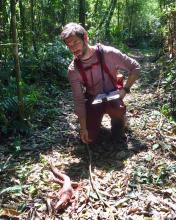Jack McBride graduated in Spring 2017 from the University of Washington with a bachelors degree from the honors program in Anthropology: Human Evolutionary Biology. Jack is currently working as a volunteer and intern coordinator at Para La Tierra, a non-profit dedicated to conserving fragile habitats in Paraguay through scientific research, community engagement, and environmental education.
What brought you to Anthropology?
I started my undergraduate career with little to no idea of what I wanted to study. I initially enrolled in a mix of classes, including political science classes (which ended up as my minor) and introductory programming classes. For close to two years I took classes from a variety of departments with little drive or pull to one in specific. In the end it was my first class in primatology which cemented my desire to go on to major in anthropology and join the honors colloquium.
In retrospect it all made sense: I'd long been interested in the interactions of individuals and systems, and one of my favorite authors is Ursula K. Le Guin, but during the process it was all very confusing. (In case the Le Guin bit is confusing: Her books are often written with an anthropological perspective and grounding and her father was an anthropologist who received his PhD from Franz Boas.)
How would you describe your field of study/research to a friend who is not an anthropologist?
I work primarily in field biology, with my personal interest mainly being primates — though I have learned to enjoy all species as subjects more than I might have imagined. However, I also make forays into environmental education, nonprofit administration, museum work and taxonomy, etc.
A few common threads through much of field research as I've experienced it would be: maintaining flexibility to your study's schedule (early mornings, long days, late nights, intermittent chasing or searching, etc.), and on-the-spot problem solving (working with local communities, reaching a difficult to navigate environment, adapting gear to new or unintentional uses).
My priorities going forward are to continue engaging in — and eventually leading — research related to evolutionary ecology, especially with regard to anthropogenic fragmentation, how education and community outreach can interface with conservation, and more broadly the interface between human psychology, sociology and conservation.
What drew you to your topic?
I had a profound desire to live in South America, somewhere near primates, and after finding Fundación Para La Tierra I realized that to be surrounded by people interested in the welfare of the natural world, and the systems which make it up, is some fundamental block of existence which makes me happy/fulfilled.
It was also the excellent teaching and support of Professors Lisa Jones-Engel, Alexander Hill, Radhika Govindrajan, Brandon Derman and Henry Staten (the last two taught classes of mine which were not in the Department of Anthropology) which helped build my interest and confidence in pursuing my academic interests and ultimately allowed me to complete my undergraduate degree and thesis, find employment afterwards, subsequently find a position related to primatology/field research, and fulfill that aforementioned desire.
How do you use your degree in your professional life?
The problem-solving skills I learned both in my classes, from conversations with professors, and from my thesis apply near daily to my current position as intern and volunteer coordinator (supporting varied projects, managing the differing interests in play at any given moment).
Perhaps even more helpful are the perspective and analytical skills a degree in anthropology fosters. To manage stress in a wide variety of situations and to be able to sit back and consider the positionality, context, needs and stressors on all those involved; rather than react or think narrowly is one of the most valuable abilities one can obtain (one which I am still always working to improve). It has helped in this position as well as during my time as a veterinary assistant at a rapid-paced urban clinic.
More directly, it has given me the language and experience to assist in publications, data-recording on primates and other research subjects, and experience critiquing others research questions, ideas, etc. effectively — the last of which has been particularly helpful as a coordinator and support professional.
How does your degree impact your life outside of your career?
Most likely the main thing is the same as the second item mentioned above: a focus on broader context and the tools and language with which to analyze it is invaluable in every situation. From managing mental health and acknowledging the need for self-care, to supporting coworkers or volunteers in difficult situations, to staying calm when presented with a situation which at least superficially seems entirely foreign and scary.
What’s next?
I'm incredibly happy to be where I'm at currently, in the medium-term I plan on continuing my education to better my ability to accomplish the above research priorities, but the exact details of where, when, or what exact form that will all take is still up-in-the-air.
What advice would you give a student today about a career in anthropology?
I really only have the advice I give to myself after getting lots of good advice from mentors and friends...
Stay flexible with regard to the future. The best way to do so in a healthy way is to foster a good relationship with yourself, good self-esteem, confidence, and openness to new experiences. So listen to music you like, read non-academic books, work hard but listen to yourself when you need to take a break or ask for help, don't keep doing something that is making you solely unhappy or worn out, go to events and try to make connections but don't over-analyze them after the fact, and trust in your skills and abilities even if a task or position seems daunting.
